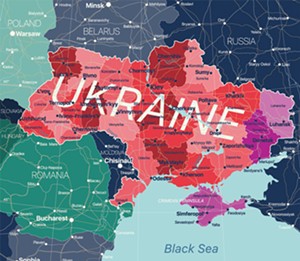Russia, by taking the Crimea in 2014 and invading the Donbass region of the Ukraine, broke the peace compact. No nation may use force to change international borders. Now Russia threatens to completely shatter this international understanding by again invading its neighbor, the Ukraine. President Putin states that his demands are defensive, to ensure the security of Russia. This is nonsense. Neither the West nor the Ukrainians have any desire to attack Russia. Putin's real security danger is his lack of support back home in Russia.
Based on Russia's recent actions, Putin's objectives are clear. He despairs over Russia's loss of empire and seeks to partly restore it by ensuring control over the Near-Abroad, those countries proximate to Russia. He insists on this control to ensure that none of these countries, formerly part of the Soviet Union, develop into prosperous democracies. This, in Putin's view, would set the wrong model for the Russian people. And he will use every trick to sow discord among European countries, encourage and support authoritarian countries like Poland and Hungary to help weaken the European Union, and further political dysfunction in the United States by intervening through social media.
His tactics of using Russian troops in a crackdown on peaceful demonstrations and revolts are working in Belarus and Kazakhstan. This keeps these dictators dependent on Russia. However, Putin is paying a high price. Russian threats have achieved the opposite of his objective, namely, uniting the people along his border with contempt and fear of Russia. The Ukrainian people are of one mind in opposing Russia, even the Russian-speaking Ukrainians who formerly favored Russia. Putin has also galvanized many Europeans into fervent rejection of Russian intimidation.
President Biden has led a unified Western policy of imposing severe sanctions if invasion takes place. This includes Germany not opening the new Russian gas pipeline, denying Russia access to the dollar currency world and maybe partly to transactions in Euros, as well as probably blocking the dollar fortunes held by Russian oligarchs in safekeeping abroad. President Biden's foremost task now is to specify what sanctions will be imposed and make sure the U.S. and Europe agree and both will support the sanctions. Disunity would encourage the Russian bear to prowl. So far Europe appears to be united.
If military actions commence, Russia – with thousands of troops, armor and artillery deployed – has superior strength, especially since it can simultaneously attack from many positions along the Ukraine border and now also from Belarus. The Ukrainian people are united in defense of their homeland, even many of those who speak Russian and were formerly favorable to Russia. Therefore, the only favorable outcome for Ukraine and the West of this Russian crisis is a peaceful, diplomatic solution.
The stakes are high. History tells us that in an international "balance of power" setting, only unified resistance to an aggressive power can maintain the status quo balance. After the Napoleonic Wars, both the victors and defeated France agreed in the Paris Treaty of 1815 that they would gang up on any country that aggressively forced changes in international borders. This concord kept the peace for almost 100 years, except for the short Franco-Prussian war. In a balance of power, if an unruly nation senses weakness in the resolve of countries to act to keep the balance, it will often act as Hitler did in the late 1930s when he sensed weakness in France and England.
Today both Russia and China have decided that the United States is a declining power, beset by internal schisms and deadlock. This invites both countries to consider making mischief, throwing the existing international system into disarray. Russia is clearly testing Western resolve by its threats and cyberattacks on the Ukraine, and its prohibitions on NATO in order to place a government favorable to Russia in Kyiv. As discussions between Russia and the West revealed during the week of Jan. 18, Russian demands were designed to be rejected, thus giving Russia an excuse to invade. Likewise, China is watching in the wings at Western resolve and unity as it daily threatens Taiwan with its Hong Kong treatment.
No one can know what consequences will follow if Russia acts in a reprehensible and unprovoked invasion of the Ukraine. Also, no one – perhaps not even Putin himself – can know if Russia will strike a match to the dry tinder along the Ukrainian border.
Roy Wehrle of Springfield is Emeritus Professor at University of Illinois Springfield and former Economic Counsellor with the Department of State.


